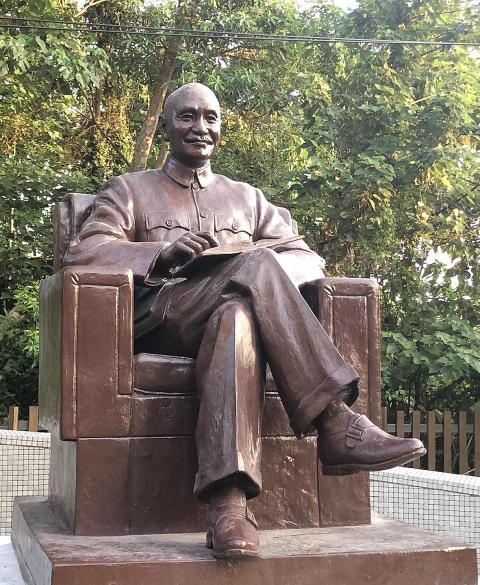National Chengchi University late on Friday night said it had removed a bronze statue of Chiang Kai-shek (蔣介石), its first president, from its campus in accordance with a resolution passed in January at an internal meeting of faculty and student representatives.
The statue, which formerly stood at the university’s library, was relocated to Hua Hsing Children’s Home — founded by Chiang’s wife Soong Mayling (宋美齡) — in Taipei’s Shilin District (士林), the school said.
The internal meeting was held to decide which of two statues of Chiang would be removed, with the one in the library chosen by a vote of 54 to 37.

Photo courtesy of National Chengchi University
The other Chiang statue, which portrays him on horseback, remains on a hill on campus.
In an apparent attempt to downplay the issue, the university issued a news release about the statue’s relocation just before midnight on Friday.
Crediting Chiang as its first president, the university looked back on its history: It was founded by the Chinese Nationalist Party (KMT) in Nanjing, China, to cultivate party cadres and was later turned into the Central School of Governance. It took on its current iteration following its restoration in Taiwan after the KMT’s defeat in the Chinese Civil War.
Hua Hsing Children’s Home has served as a shelter for the children of deceased soldiers, poor families and households affected by typhoons or earthquakes, the university said, calling on the media to refrain from visiting it.
A campaign to remove the two statues of Chiang on the campus was in February 2016 launched by the university’s students, who plastered flyers bearing the names of 228 Incident victims on the statue in the library.
Over the past few years, a growing number of historians and academics have named Chiang as a leading figure in the Incident.
A motion to remove a statue was filed at the January meeting after 455 faculty and students in September last year voted on the school’s iConcern online polling platform to have them removed, while 442 voted to retain both statues.
In 2014, a student in the Department of Ethnology spray-painted “authoritarianism’s poisonous legacy” and “historical murderer” on the statute in the library.

The Ministry of the Interior (MOI) is to tighten rules for candidates running for public office, requiring them to declare that they do not hold a Chinese household registration or passport, and that they possess no other foreign citizenship. The requirement was set out in a draft amendment to the Enforcement Rules of the Public Officials Election and Recall Act (公職人員選舉罷免法 ) released by the ministry on Thursday. Under the proposal, candidates would need to make the declaration when submitting their registration forms, which would be published in the official election bulletin. The move follows the removal of several elected officials who were

The Republic of China (ROC) is celebrating its 114th Double Ten National Day today, featuring military parades and a variety of performances and speeches in front of the Presidential Office in Taipei. The Taiwan Taiko Association opened the celebrations with a 100-drummer performance, including young percussionists. As per tradition, an air force Mirage 2000 fighter jet flew over the Presidential Office as a part of the performance. The Honor Guards of the ROC and its marching band also heralded in a military parade. Students from Taichung's Shin Min High School then followed with a colorful performance using floral imagery to represent Taiwan's alternate name

FOUR DESIGNATED AREAS: Notices were issued for live-fire exercises in waters south and northwest of Penghu, northeast of Keelung and west of Kaohsiung, they said The military is planning three major annual exercises across the army, navy and air force this month, with the navy’s “Hai Chiang” (海強, “Sea Strong”) drills running from today through Thursday, the Ministry of National Defense said yesterday. The Hai Chiang exercise, which is to take place in waters surrounding Taiwan, would feature P-3C Orion maritime patrol aircraft and S-70C anti-submarine helicopters, the ministry said, adding that the drills aim to bolster the nation’s offshore defensive capabilities. China has intensified military and psychological pressure against Taiwan, repeatedly sending warplanes and vessels into areas near the nation’s air defense identification zone and across

A Chinese takeover of Taiwan would severely threaten the national security of the US, Japan, the Philippines and other nations, while global economic losses could reach US$10 trillion, National Security Council Deputy Secretary-General Lin Fei-fan (林飛帆) wrote in an article published yesterday in Foreign Affairs. “The future of Taiwan is not merely a regional concern; it is a test of whether the international order can withstand the pressure of authoritarian expansionism,” Lin wrote in the article titled “Taiwan’s Plan for Peace Through Strength — How Investments in Resilience Can Deter Beijing.” Chinese President Xi Jinping’s (習近平) intent to take Taiwan by force